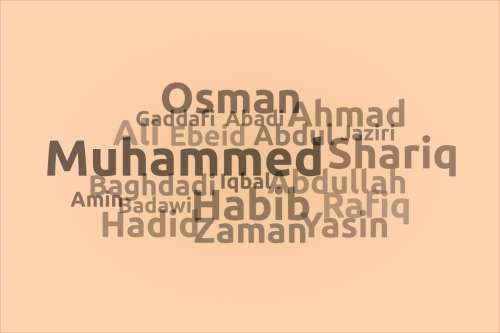Arabic surnames carry rich cultural significance. Many parents seek meaningful names that connect their children to their heritage. However, finding the perfect surname can be challenging with so many options available.
I’m here to help simplify your search for an ideal Arabic surname. This article will provide a curated list of over 151+ beautiful Arabic surnames, their meanings, and their origins.
You’ll find classic and modern options, from names inspired by nature to those rooted in noble qualities. Whether you’re looking for something traditional or unique, this list covers you.
Let’s explore these Arabic surnames to find the perfect fit for your little one.
List of Beautiful Arabic Surnames

1. Abbas
- Meaning: Lion
- Origin: Arabic
- Cultural Significance: Abbas is a common Arabic name that signifies bravery and strength.
2. Abdallah
- Meaning: Servant of God
- Origin: Arabic
- Cultural Significance: A name commonly given in Islamic cultures to show devotion to God.
3. Abdul
- Meaning: Servant
- Origin: Arabic
- Cultural Significance: Often used as a prefix in combination with one of the 99 names of Allah.
4. Abu
- Meaning: Father of
- Origin: Arabic
- Cultural Significance: Used to denote the father of a child, often used in kunya.
5. Adel
- Meaning: Just, fair
- Origin: Arabic
- Cultural Significance: A name representing justice and fairness in character.
6. Afif
- Meaning: Chaste, modest
- Origin: Arabic
- Cultural Significance: Symbolizes purity and modesty in one’s actions and character.
7. Ahmad
- Meaning: Highly praised
- Origin: Arabic
- Cultural Significance: A name of the Prophet Muhammad, representing praise and honor.
8. Ahsan
- Meaning: Best, most beautiful
- Origin: Arabic
- Cultural Significance: Denotes excellence and beauty, often in character or appearance.
9. Akbar
- Meaning: Greater
- Origin: Arabic
- Cultural Significance: Often used to denote greatness, commonly in the phrase “Allahu Akbar.”
10. Alami
- Meaning: Universal
- Origin: Arabic
- Cultural Significance: Reflects a global or universal perspective.
11. Ali
- Meaning: Elevated, high
- Origin: Arabic
- Cultural Significance: A name of great significance in Islam, associated with the fourth caliph, Ali ibn Abi Talib.
12. Amari
- Meaning: Builder
- Origin: Arabic
- Cultural Significance: Symbolizes construction and growth, both physically and metaphorically.
13. Amin
- Meaning: Trustworthy, faithful
- Origin: Arabic
- Cultural Significance: Represents trustworthiness and faith, key virtues in many cultures.
14. Amiri
- Meaning: Prince, ruler
- Origin: Arabic
- Cultural Significance: Denotes leadership and nobility.
15. Ansari
- Meaning: Supporter
- Origin: Arabic
- Cultural Significance: Refers to those who supported the Prophet Muhammad during his migration to Medina.
16. Anwar
- Meaning: Luminous
- Origin: Arabic
- Cultural Significance: Symbolizes light and brightness, both literally and figuratively.
17. Aqil
- Meaning: Intelligent, wise
- Origin: Arabic
- Cultural Significance: Represents intelligence and wisdom, important traits in many cultures.
18. Arif
- Meaning: Knowledgeable
- Origin: Arabic
- Cultural Significance: Denotes someone who is wise and learned.
19. Asad
- Meaning: Lion
- Origin: Arabic
- Cultural Significance: Symbolizes strength and bravery.
20. Asghar
- Meaning: Younger, smaller
- Origin: Arabic
- Cultural Significance: Often used to denote someone who is younger or lesser in age.
21. Ashraf
- Meaning: Honorable, noble
- Origin: Arabic
- Cultural Significance: Represents nobility and honor.
22. Asim
- Meaning: Protector
- Origin: Arabic
- Cultural Significance: Denotes protection and safety.
23. Atiyeh
- Meaning: Gift
- Origin: Arabic
- Cultural Significance: Symbolizes something given as a blessing.
24. Awwad
- Meaning: Rewarder
- Origin: Arabic
- Cultural Significance: Represents someone who gives rewards.
25. Ayad
- Meaning: Powerful, able
- Origin: Arabic
- Cultural Significance: Denotes strength and capability.
26. Aziz
- Meaning: Dear, beloved
- Origin: Arabic
- Cultural Significance: Represents something or someone precious and valued.
27. Badawi
- Meaning: Nomad
- Origin: Arabic
- Cultural Significance: Refers to a Bedouin, symbolizing the nomadic lifestyle.
28. Bakir
- Meaning: Early, punctual
- Origin: Arabic
- Cultural Significance: Represents timeliness and promptness.
29. Bakkar
- Meaning: One who rises early
- Origin: Arabic
- Cultural Significance: Symbolizes diligence and hard work.
30. Baligh
- Meaning: Eloquent, mature
- Origin: Arabic
- Cultural Significance: Denotes eloquence and maturity, often in speech.
31. Barakat
- Meaning: Blessings
- Origin: Arabic
- Cultural Significance: Symbolizes prosperity and divine favor.
32. Basim
- Meaning: Smiling
- Origin: Arabic
- Cultural Significance: Represents joy and happiness.
33. Basri
- Meaning: Visionary, insightful
- Origin: Arabic
- Cultural Significance: Denotes someone with great insight and vision.
34. Bashir
- Meaning: Bringer of good news
- Origin: Arabic
- Cultural Significance: Symbolizes positivity and good tidings.
35. Bitar
- Meaning: One who cuts
- Origin: Arabic
- Cultural Significance: Represents precision and skill, often in professions like surgery or craftsmanship.
36. Dabbagh
- Meaning: Tanner
- Origin: Arabic
- Cultural Significance: Refers to the profession of tanning hides.
37. Darwish
- Meaning: Dervish, ascetic
- Origin: Arabic
- Cultural Significance: Denotes a spiritual or ascetic person, often in Sufism.
38. Dawood
- Meaning: Beloved
- Origin: Arabic
- Cultural Significance: A name of a prophet in Islam, symbolizing love and devotion.
39. Deeb
- Meaning: Wolf
- Origin: Arabic
- Cultural Significance: Symbolizes cunning and strength.
40. Dib
- Meaning: Wolf
- Origin: Arabic
- Cultural Significance: Another term for wolf, representing similar traits.
41. Diab
- Meaning: Wolf
- Origin: Arabic
- Cultural Significance: Yet another term for wolf, emphasizing strength and cunning.
42. Eid
- Meaning: Festival, celebration
- Origin: Arabic
- Cultural Significance: Refers to Islamic holidays, symbolizing joy and festivity.
43. Eissa
- Meaning: Jesus
- Origin: Arabic
- Cultural Significance: Name of the prophet Jesus in Islam, representing purity and faith.
44. El-Amin
- Meaning: The trustworthy
- Origin: Arabic
- Cultural Significance: A title given to the Prophet Muhammad, symbolizing trust and reliability.
45. El-Sayed
- Meaning: The master
- Origin: Arabic
- Cultural Significance: Denotes respect and leadership.
46. Faheem
- Meaning: Intelligent
- Origin: Arabic
- Cultural Significance: Represents intellect and understanding.
47. Fahim
- Meaning: Understanding, intelligent
- Origin: Arabic
- Cultural Significance: Another term for intelligence and comprehension.
48. Faisal
- Meaning: Decisive
- Origin: Arabic
- Cultural Significance: Denotes the ability to make clear decisions.
49. Fakhoury
- Meaning: Proud
- Origin: Arabic
- Cultural Significance: Symbolizes pride and dignity.
50. Faraj
- Meaning: Relief, comfort
- Origin: Arabic
- Cultural Significance: Represents the alleviation of pain or trouble.
51. Farhat
- Meaning: Joy
- Origin: Arabic
- Cultural Significance: Symbolizes happiness and delight.
52. Farouk
- Meaning: One who distinguishes between right and wrong
- Origin: Arabic
- Cultural Significance: Denotes someone with a strong sense of justice.
53. Farsi
- Meaning: Persian
- Origin: Arabic
- Cultural Significance: Refers to the Persian language or people.
54. Fawzi
- Meaning: Victorious
- Origin: Arabic
- Cultural Significance: Symbolizes success and victory.
55. Fayed
- Meaning: Benefit
- Origin: Arabic
- Cultural Significance: Represents something or someone that brings benefit.
56. Ganim
- Meaning: Successful, prosperous
- Origin: Arabic
- Cultural Significance: Symbolizes success and prosperity.
57. Ghannam
- Meaning: Shepherd
- Origin: Arabic
- Cultural Significance: Denotes someone who takes care of sheep, symbolizing leadership and care.
58. Gharib
- Meaning: Stranger, foreigner
- Origin: Arabic
- Cultural Significance: Represents someone from a different place or culture.
59. Habib
- Meaning: Beloved
- Origin: Arabic
- Cultural Significance: Symbolizes love and affection.
60. Hadi
- Meaning: Guide
- Origin: Arabic
- Cultural Significance: Represents someone who guides others, often in a spiritual or moral sense.
61. Hadid
- Meaning: Iron
- Origin: Arabic
- Cultural Significance: Symbolizes strength and resilience.
62. Hafiz
- Meaning: Guardian
- Origin: Arabic
- Cultural Significance: Represents someone who protects and preserves, often used for those who have memorized the Quran.
63. Hakim
- Meaning: Wise
- Origin: Arabic
- Cultural Significance: Denotes wisdom and knowledge.
64. Halabi
- Meaning: From Aleppo
- Origin: Arabic
- Cultural Significance: Refers to someone from the city of Aleppo.
65. Hamad
- Meaning: Praised
- Origin: Arabic
- Cultural Significance: Symbolizes praise and admiration.
66. Hamdi
- Meaning: Praised
- Origin: Arabic
- Cultural Significance: Another term for praise and admiration.
67. Hamid
- Meaning: Praised
- Origin: Arabic
- Cultural Significance: Denotes someone who is praised and admired.
68. Hammoud
- Meaning: Praised
- Origin: Arabic
- Cultural Significance: Yet another term for praise and admiration.
69. Hanafi
- Meaning: Follower of the Hanafi school
- Origin: Arabic
- Cultural Significance: Refers to those who follow the Hanafi school of Islamic jurisprudence.
70. Hanif
- Meaning: True believer
- Origin: Arabic
- Cultural Significance: Represents someone who follows the monotheistic traditions of Abraham.
71. Hariri
- Meaning: Silk merchant
- Origin: Arabic
- Cultural Significance: Denotes someone involved in the silk trade.
72. Hashim
- Meaning: Crusher of evil
- Origin: Arabic
- Cultural Significance: A name associated with the great-grandfather of the Prophet Muhammad, symbolizing strength and righteousness.
73. Hassan
- Meaning: Handsome, good
- Origin: Arabic
- Cultural Significance: Represents beauty and goodness.
74. Hatem
- Meaning: Decisive
- Origin: Arabic
- Cultural Significance: Denotes the ability to make firm decisions.
75. Hazim
- Meaning: Resolute, firm
- Origin: Arabic
- Cultural Significance: Symbolizes determination and firmness.
76. Hijazi
- Meaning: From the Hijaz region
- Origin: Arabic
- Cultural Significance: Refers to someone from the Hijaz region in Saudi Arabia.
77. Hilal
- Meaning: Crescent moon
- Origin: Arabic
- Cultural Significance: Symbolizes the Islamic calendar and the beginning of months.
78. Hisham
- Meaning: Generous
- Origin: Arabic
- Cultural Significance: Represents generosity and kindness.
79. Husseini
- Meaning: Descendant of Hussein
- Origin: Arabic
- Cultural Significance: Refers to those who are descendants of Hussein, the grandson of the Prophet Muhammad.
80. Ibrahim
- Meaning: Father of many
- Origin: Arabic
- Cultural Significance: A name of a prophet in Islam, symbolizing fatherhood and leadership.
81. Idris
- Meaning: Interpreter
- Origin: Arabic
- Cultural Significance: Name of a prophet in Islam, symbolizing wisdom and knowledge.
82. Ijaz
- Meaning: Miracle
- Origin: Arabic
- Cultural Significance: Represents something miraculous and extraordinary.
83. Imad
- Meaning: Pillar
- Origin: Arabic
- Cultural Significance: Symbolizes support and strength.
84. Ismail
- Meaning: God will hear
- Origin: Arabic
- Cultural Significance: Name of a prophet in Islam, representing faith and devotion.
85. Issa
- Meaning: Jesus
- Origin: Arabic
- Cultural Significance: Another name for Jesus in Islam, symbolizing purity and faith.
86. Jabir
- Meaning: Consoler
- Origin: Arabic
- Cultural Significance: Represents comfort and support.
87. Jafar
- Meaning: Stream
- Origin: Arabic
- Cultural Significance: Symbolizes flow and abundance.
88. Jameel
- Meaning: Beautiful
- Origin: Arabic
- Cultural Significance: Represents beauty and attractiveness.
89. Jamshid
- Meaning: Shining, radiant
- Origin: Persian
- Cultural Significance: Symbolizes brilliance and radiance.
90. Jibril
- Meaning: Gabriel
- Origin: Arabic
- Cultural Significance: Name of an archangel in Islam, representing strength and guidance.
91. Juma
- Meaning: Friday
- Origin: Arabic
- Cultural Significance: Represents the holy day of gathering for Muslims.
92. Jundi
- Meaning: Soldier
- Origin: Arabic
- Cultural Significance: Denotes someone who serves in the military.
93. Kamal
- Meaning: Perfection
- Origin: Arabic
- Cultural Significance: Symbolizes completeness and excellence.
94. Karim
- Meaning: Generous, noble
- Origin: Arabic
- Cultural Significance: Represents generosity and nobility.
95. Kassim
- Meaning: Divided, distributor
- Origin: Arabic
- Cultural Significance: Denotes someone who distributes or shares.
96. Kazim
- Meaning: Restrainer of anger
- Origin: Arabic
- Cultural Significance: Represents self-control and patience.
97. Khalid
- Meaning: Eternal, immortal
- Origin: Arabic
- Cultural Significance: Symbolizes eternity and lasting legacy.
98. Khalil
- Meaning: Friend
- Origin: Arabic
- Cultural Significance: Represents friendship and companionship.
99. Khoury
- Meaning: Priest
- Origin: Arabic
- Cultural Significance: Refers to a priest or religious leader.
100. Khuzaimah
- Meaning: A tree with thorns
- Origin: Arabic
- Cultural Significance: Symbolizes resilience and strength.
101. Labib
- Meaning: Intelligent, sensible
- Origin: Arabic
- Cultural Significance: Represents wisdom and understanding.
102. Latif
- Meaning: Kind, gentle
- Origin: Arabic
- Cultural Significance: Symbolizes kindness and gentleness.
103. Lutf
- Meaning: Kindness, favor
- Origin: Arabic
- Cultural Significance: Represents acts of kindness and generosity.
104. Mahdi
- Meaning: Guided one
- Origin: Arabic
- Cultural Significance: Represents guidance and leadership in Islam.
105. Mahmud
- Meaning: Praised
- Origin: Arabic
- Cultural Significance: Denotes someone who is praised and admired.
106. Majid
- Meaning: Glorious
- Origin: Arabic
- Cultural Significance: Symbolizes glory and greatness.
107. Malik
- Meaning: King
- Origin: Arabic
- Cultural Significance: Represents royalty and leadership.
108. Mansour
- Meaning: Victorious
- Origin: Arabic
- Cultural Significance: Symbolizes victory and success.
109. Marwan
- Meaning: Flint stone
- Origin: Arabic
- Cultural Significance: Denotes strength and resilience.
110. Masri
- Meaning: Egyptian
- Origin: Arabic
- Cultural Significance: Refers to someone from Egypt.
111. Mazin
- Meaning: Rain clouds
- Origin: Arabic
- Cultural Significance: Symbolizes abundance and blessing.
112. Mikhail
- Meaning: Michael
- Origin: Arabic
- Cultural Significance: Name of an archangel in Islam, representing protection and strength.
113. Mirza
- Meaning: Prince
- Origin: Persian
- Cultural Significance: Denotes nobility and leadership.
114. Mufid
- Meaning: Useful
- Origin: Arabic
- Cultural Significance: Represents usefulness and benefit.
115. Muhsin
- Meaning: Benefactor
- Origin: Arabic
- Cultural Significance: Symbolizes someone who does good deeds.
116. Mukhtar
- Meaning: Chosen
- Origin: Arabic
- Cultural Significance: Represents someone selected or chosen for a special purpose.
117. Munir
- Meaning: Radiant
- Origin: Arabic
- Cultural Significance: Symbolizes brightness and light.
118. Musa
- Meaning: Moses
- Origin: Arabic
- Cultural Significance: Name of a prophet in Islam, symbolizing leadership and faith.
119. Mushtaq
- Meaning: Longing, yearning
- Origin: Arabic
- Cultural Significance: Represents deep desire and longing.
120. Mustafa
- Meaning: Chosen, selected
- Origin: Arabic
- Cultural Significance: A title of the Prophet Muhammad, symbolizing being chosen by God.
121. Nabeel
- Meaning: Noble
- Origin: Arabic
- Cultural Significance: Represents nobility and honor.
122. Nadim
- Meaning: Companion
- Origin: Arabic
- Cultural Significance: Denotes friendship and companionship.
123. Nadir
- Meaning: Rare
- Origin: Arabic
- Cultural Significance: Symbolizes uniqueness and rarity.
124. Naim
- Meaning: Comfort, tranquility
- Origin: Arabic
- Cultural Significance: Represents peace and comfort.
125. Najjar
- Meaning: Carpenter
- Origin: Arabic
- Cultural Significance: Refers to someone who works with wood.
126. Najm
- Meaning: Star
- Origin: Arabic
- Cultural Significance: Symbolizes brightness and guidance.
127. Naji
- Meaning: Safe
- Origin: Arabic
- Cultural Significance: Represents safety and protection.
128. Nasir
- Meaning: Helper
- Origin: Arabic
- Cultural Significance: Symbolizes assistance and support.
129. Nawaf
- Meaning: High, lofty
- Origin: Arabic
- Cultural Significance: Represents elevation and nobility.
130. Nazim
- Meaning: Organizer
- Origin: Arabic
- Cultural Significance: Denotes someone who organizes or arranges things.
131. Noor
- Meaning: Light
- Origin: Arabic
- Cultural Significance: Symbolizes brightness and enlightenment.
132. Nuri
- Meaning: My light
- Origin: Arabic
- Cultural Significance: Represents personal illumination and guidance.
133. Omair
- Meaning: Intelligent, insightful
- Origin: Arabic
- Cultural Significance: Symbolizes intelligence and understanding.
134. Omari
- Meaning: Flourishing
- Origin: Arabic
- Cultural Significance: Represents growth and prosperity.
135. Osman
- Meaning: Devoted servant
- Origin: Arabic
- Cultural Significance: Denotes dedication and service.
136. Qadir
- Meaning: Capable
- Origin: Arabic
- Cultural Significance: Symbolizes ability and power.
137. Qasim
- Meaning: Distributor
- Origin: Arabic
- Cultural Significance: Represents someone who shares or divides.
138. Qazi
- Meaning: Judge
- Origin: Arabic
- Cultural Significance: Denotes someone who adjudicates and delivers justice.
139. Rabee
- Meaning: Spring
- Origin: Arabic
- Cultural Significance: Symbolizes renewal and new beginnings.
140. Radi
- Meaning: Content
- Origin: Arabic
- Cultural Significance: Represents satisfaction and contentment.
141. Rafi
- Meaning: Noble, exalted
- Origin: Arabic
- Cultural Significance: Symbolizes high status and nobility.
142. Rahim
- Meaning: Merciful
- Origin: Arabic
- Cultural Significance: Represents mercy and compassion.
143. Rahman
- Meaning: Compassionate
- Origin: Arabic
- Cultural Significance: Denotes deep compassion and kindness.
144. Rashad
- Meaning: Good guidance
- Origin: Arabic
- Cultural Significance: Symbolizes wise and beneficial guidance.
145. Rashid
- Meaning: Rightly guided
- Origin: Arabic
- Cultural Significance: Represents someone who follows the right path.
146. Rauf
- Meaning: Kind, compassionate
- Origin: Arabic
- Cultural Significance: Denotes kindness and deep compassion.
147. Razi
- Meaning: Satisfied
- Origin: Arabic
- Cultural Significance: Represents contentment and satisfaction.
148. Reza
- Meaning: Contentment
- Origin: Persian
- Cultural Significance: Symbolizes happiness and contentment.
149. Ridha
- Meaning: Contentment
- Origin: Arabic
- Cultural Significance: Another term for satisfaction and contentment.
150. Rizvi
- Meaning: Descendant of Ali
- Origin: Arabic
- Cultural Significance: Refers to those who are descendants of Ali ibn Abi Talib.
151. Saad
- Meaning: Happiness
- Origin: Arabic
- Cultural Significance: Symbolizes joy and delight.
152. Saadi
- Meaning: Lucky
- Origin: Arabic
- Cultural Significance: Represents good fortune and luck.
153. Sadiq
- Meaning: Truthful
- Origin: Arabic
- Cultural Significance: Denotes honesty and integrity.
154. Safi
- Meaning: Pure
- Origin: Arabic
- Cultural Significance: Represents purity and clarity.
155. Saghir
- Meaning: Small
- Origin: Arabic
- Cultural Significance: Denotes smallness or youth.
156. Sahir
- Meaning: Wakeful
- Origin: Arabic
- Cultural Significance: Represents vigilance and alertness.
Conclusion
Let’s wrap up our journey through Arabic surnames. We’ve explored many traditional and modern options, each carrying its special meaning. Remember, the surname you choose for your child will be a lasting part of their identity.
When picking a surname, consider how it sounds with your child’s first name and what values you want it to represent. Don’t rush the decision—take your time to find one that feels right for your family.
I hope this list has given you some great ideas for your little one’s surname. If you’re still unsure, why not ask family members for their thoughts? They might offer valuable insights or family traditions you hadn’t considered.
What surname are you leaning towards? Share your favorites in the comments below!


















